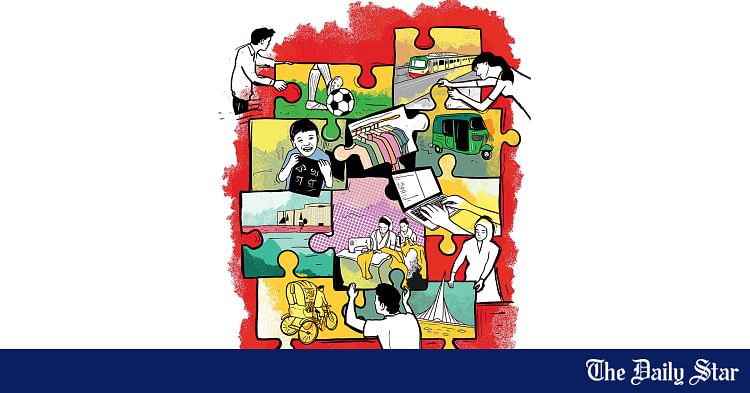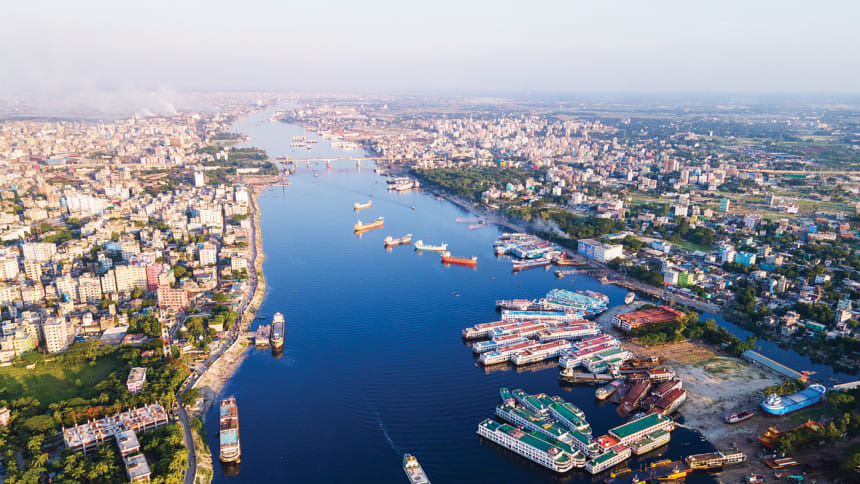Illustration: Ehsanur Raza Ronny
“>
Illustration: Ehsanur Raza Ronny
Economic disparity has been a recurring theme in the history of Bangladesh, shaping its past, influencing its present, and challenging its aspirations for the future. From tales of tyranny to the struggle for independence, the narrative of inequality has been a constant companion in the nation’s journey. As Bangladesh sets its sights on a new era, dubbed ‘Bangladesh 2.0’, the call for reducing economic disparity is louder than ever, driven largely by the youth who spearheaded the July Uprising of 2024.
The seeds of economic inequality were sown long before Bangladesh’s independence. Stories of exploitative practices during the Mughal and Maratha periods, though now largely anecdotal, are still shared as cautionary tales. The British colonial era institutionalised these disparities, with resources from Bengal diverted to serve imperial interests. This period witnessed devastating famines and systemic impoverishment, cementing a legacy of economic deprivation.
The partition of British India in 1947 did little to address these inequities. Under Pakistan’s rule, East Bengal (later East Pakistan) found itself further marginalised. The economic policies of the central government were heavily skewed in favour of West Pakistan, leading to pronounced regional disparities. Despite constituting the majority of the population, East Pakistan received only a fraction of the resources and investments. This imbalance fuelled discontent, ultimately culminating in the Liberation War of 1971.
When Bangladesh emerged as an independent nation, there was widespread hope that the new state would rectify these injustices. Yet, despite notable achievements in poverty reduction, literacy, and health, economic inequality has persisted and, in some cases, widened. The gap between the wealthy elite and the majority population remains stark, with rural areas and marginalised communities often left behind.
Fast forward to 2024, when the July Uprising highlighted the simmering frustrations of a generation grappling with these enduring disparities. The youth, armed with modern technology and inspired by global movements, led the charge for systemic change. Their demands extended beyond political reforms, calling for an economy that is inclusive and equitable. The recently published ‘White Paper’ added momentum to this movement by exposing the extent of economic discrepancies. The report revealed alarming disparities in income distribution, access to quality education and healthcare, and employment opportunities. It also pointed to systemic issues such as corruption, lack of transparency, and the concentration of wealth in the hands of a few.
The concept of ‘Bangladesh 2.0’ embodies a vision of a nation that is progressive, inclusive, and resilient. Central to this vision is the reduction of economic disparity, a goal that resonates deeply with the youth who played a pivotal role in the uprising. Their aspirations reflect a desire for equitable growth that moves beyond GDP as the sole indicator of progress, shifting the focus to inclusive growth that benefits all segments of society. They envision an economy that creates jobs that are not only abundant but also dignified, offering fair wages and benefits while empowering women and marginalised groups. Addressing disparities in education and healthcare is crucial to ensuring that every citizen has the opportunity to reach their full potential. Moreover, reducing the urban-rural divide through strategic investments in infrastructure, industries, and services in underdeveloped regions is fundamental to this vision.
The concept of ‘Bangladesh 2.0’ embodies a vision of a nation that is progressive, inclusive, and resilient. Central to this vision is the reduction of economic disparity. Image: Md Maruf Hassan/Getty Images
“>
The concept of ‘Bangladesh 2.0’ embodies a vision of a nation that is progressive, inclusive, and resilient. Central to this vision is the reduction of economic disparity. Image: Md Maruf Hassan/Getty Images
While the vision is inspiring, the road to achieving it is fraught with challenges. Economic disparity is a complex issue rooted in historical, structural, and systemic factors, and addressing it requires a multifaceted approach and a commitment to long-term reforms. One of the key obstacles is the lack of expertise. While the youth have been instrumental in driving change, they often lack the technical knowledge needed to address complex economic issues. Bridging this gap requires investment in education and training, as well as collaboration with experienced professionals who can provide guidance and mentorship. Institutional resistance poses another significant challenge. Established systems and vested interests often resist change to protect the status quo. Overcoming this inertia requires strong political will, transparency, and accountability at all levels of governance. Additionally, Bangladesh’s vulnerability to global economic fluctuations adds another layer of complexity. As a developing nation, it faces external pressures that can undermine economic stability. Building resilience through diversification and sustainable practices is crucial to mitigate these risks. Corruption remains a pervasive issue, undermining efforts to promote equity and fairness. Tackling corruption at all levels is essential to ensure that resources are allocated efficiently and that economic opportunities are accessible to all.
To realise the vision of ‘Bangladesh 2.0’, a comprehensive strategy is needed. This strategy should encompass policy reforms that promote equitable growth, including progressive taxation, land reforms, and targeted subsidies for the underprivileged. Investing in education and vocational training is vital to equip the youth with the skills necessary for a modern economy. Technological innovation must also be harnessed to improve access to services, enhance transparency, and drive economic growth. Public-private partnerships can play a crucial role in addressing disparities and fostering innovation by encouraging collaboration between the government, private sector, and civil society. Engaging local communities in decision-making processes ensures that policies are inclusive and responsive to the diverse needs of the population. Furthermore, establishing robust mechanisms to monitor progress and hold stakeholders accountable is essential to maintain momentum and ensure that reforms translate into tangible improvements.
The journey towards ‘Bangladesh 2.0’ is a collective endeavour that requires the participation of all stakeholders. While the youth have ignited the spark, sustaining the momentum demands collaboration, innovation, and a steadfast commitment to justice and equity.
The youth, who have been at the forefront of the July Uprising, hold the key to transforming Bangladesh. Their energy, creativity, and determination can drive the nation towards a more equitable future. However, their potential must be nurtured through mentorship, education, and opportunities for meaningful engagement in policy making and implementation. Programs that encourage youth-led initiatives, such as social enterprises, community development projects, and innovation hubs, can serve as powerful platforms for change. Additionally, fostering a culture of civic responsibility and critical thinking will empower young people to tackle challenges with confidence and resilience.
The journey towards ‘Bangladesh 2.0’ is a collective endeavour that requires the participation of all stakeholders. While the youth have ignited the spark, sustaining the momentum demands collaboration, innovation, and a steadfast commitment to justice and equity. Economic disparity may be deeply entrenched in Bangladesh’s history, but it does not have to define its future. By addressing the root causes of inequality and building a more inclusive economy, Bangladesh can pave the way for a brighter and more prosperous tomorrow. The vision of ‘Bangladesh 2.0’ is within reach—but only if we rise to the challenge together.
MD Shiyan Sadik is a Lecturer at the Department of Environmental Science and Management at North South University.
Sakif Al Ehsan Khan is a former Policy Fellow at the South Asian Institute of Policy and Governance at North South University.




